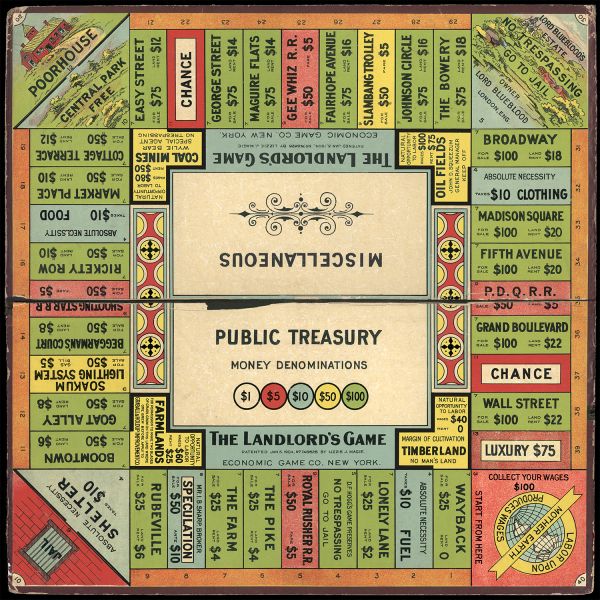The True Origin of Monopoly: Lizzie Magie and The Landlord’s Game

I grew up believing that Monopoly had been invented during the Great Depression by an unemployed man who played it around his kitchen table while dreaming of summer vacations in Atlantic City, New Jersey. So, imagine my surprise to discover a very different history while researching for my "Why I Love Monopoly" article in the Winter 2014 issue of Casual Game Insider. Here is some bonus historical material that I did not include in the magazine article.
Lizzie Magie (pronounced similarly to McGee) was a disciple of 19th century economist Henry George. George believed that while people had the right to profit from whatever they created through their own hard work, the land itself should belong equally to all since it existed naturally. Henry George argued that landowners grew rich at the expense of their non-landowning tenants who slid further into poverty. He saw private ownership of this natural resource (land) as a primary cause of poverty, inequality, and other ills of society. Henry George wanted society to capture the value of the land by taxing what the resale value would be if nothing was built on top of it. How do you make that more interesting to people who have no interest in economics?
Lizzie Magie had a creative and fun way to further George’s principles on the evils of private land ownership – she made a game about it. Magie applied for her first patent for The Landlord’s Game in 1903 (view the patent here). Even in that early patent diagram, the resemblance to modern day Monopoly is obvious with a square circuit of spaces containing railroads, a jail, luxury taxes, and several properties with various rent and sales costs.
Today, many casual gamers view Monopoly’s tendency to put losing players in a hopeless position where bankruptcy and elimination become unavoidable as a design flaw. Yet, considering Magie’s intent to demonstrate the ills of land ownership, it is reasonable to conclude that the downward spiral may not have been a flaw at all, but rather a deliberate feature of the game.
The Landlord’s Game was adopted by some university professors as a teaching tool, and the game gained a following in the mid-Atlantic states. Players would make their own hand-crafted boards, often changing the street names to match their own town or city, and adding their own favorite house rules.
Lizzie Magie Phillips (she had married in 1910) renewed her expired patent in 1924. There were several efforts to commercially publish the game by different parties under various names such as The Landlord’s Game, Monopoly, and Finance. The website www.landlordsgame.info contains a wonderful collection of boards and rules that were made during the three decades before Charles Darrow arrived on the scene.
Charles Darrow, the man long credited with the invention of Monopoly, is believed to have first played an Atlantic City version of the game in 1933. He saw the game’s potential, and made his own plans to print and sell the game. While publishing the game himself, he also pitched Monopoly to Milton Bradley and Parker Brothers, claiming to be the game’s creator. Both turned Darrow down, believing the game was too complex to have a broad market appeal. However, as Darrow’s sales figures grew, Parker Brothers changed their mind and bought the rights from Darrow.
It was only after Parker Brothers had signed the deal with Darrow that they discovered the earlier patents for The Landlord’s Game. When Parker Brothers approached Lizzie Magie Phillips, she refused any changes to her original game. Lizzie sold her patent to Parker Brothers for $500 and no royalties. Instead, she had this one key condition: in addition to publishing Monopoly, Parker Brothers must also publish the unaltered version of The Landlord’s Game.
Parker Brothers honored that agreement and manufactured a small production run of The Landlord’s Game. However, publicly they promoted the story of Charles Darrow as the inventor of Monopoly. Maybe they were saving face and didn’t want to admit that they had been duped by Darrow. Maybe it was easier to market Monopoly with the Darrow myth than with the real story of a Quaker woman trying to demonstrate the evils of land ownership. Whatever the reason, Parker Brothers continued to tell the Darrow story for decades.
It was the same story that I grew up believing. In recent years, some have tried to set the history straight — may this blog aid their cause.
For more details about the history of Lizzie Magie, The Landlord’s Game, and Monopoly, here are some further references:
http://adena.com/adena/mo/index.htm
http://inventors.about.com/library/weekly/aa121997.htm#Magie
Thank you to Thomas Forsyth of www.landlordsgame.info for providing the image of the 1906 game board of The Landlord’s Game.
A word of gratitude to fellow game designer Aaron Honsowetz for his expertise with a simplified explanation of the economic philosophy of Henry George.





I can't believe anybody cares who "invented" Monopoly any more. It's a crappy game and only serves to start family fights. Let's just say Al Gore invented it and move on!
MB!
I think this story is $%^&*&^ cool.
She got swindled out of her idea, you &^*^%$% jerk.
Doesn't that mean anything to you, you heartless *&^%$?????
I came looking for more info on Elizabeth Magie's version of the game, icluding rules. Thank you for the links.
Wow..that remark is quite something. It is not a crappy game. Much can be learned from it. As kids, we played it during the summer when Chicago heat kept us inside or on someone's porch till the cooler evening. Firghts? Well, maybe..but that is not the fault of the game. Kudos to the Lady who invented the game, to call attention to greedy Business
men and Landlords. Play On